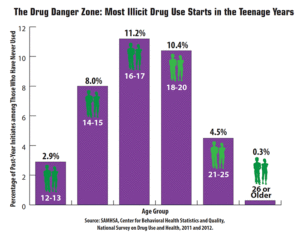Risk of drug use increases greatly during times of transition. For an adult, a divorce or loss of a job may lead to drug use; for a teenager, risky times include moving or changing schools. In early adolescence, when children enter middle school, they face new challenges including being exposed to drugs such as alcohol and cigarettes. In high school, teens may encounter social activities where drugs are present and experience increased peer pressure. College is a time where many young adults seek new experiences and want to try in things; this may include experimenting with drugs.
National data shows that children start experimenting as early as age 12; drug prevention is crucial during this time in a child’s life.

How to Start the Conversation?
Remember, you might not know all of the facts and that’s ok. Just by starting the conversation with a loved one can create a positive foundation for someone who is thinking about using or already using.
Be sure to:
- Talk early and often- Do not wait until a situation presents itself.
- Correct misconceptions together- Kids and adults who aren’t properly informed are at greater risk of engaging in unsafe behaviors and experimenting with substance use.
- Be a role model- Your attitude about drugs and behavior can influence others especially a child.
- Be realistic- Although the ultimate goal is for loved ones not to abuse drugs, we must also prioritize safety. If someone is using drugs be realistic in situations such as drinking and driving, let them know they can call for a ride, etc. with no questions asked.
If you or someone you know is struggling with a drug or alcohol problem there are people that can help! There are a variety of different types of help available such as counselors, medical professionals, and treatment centers. Reaching out for help is the first step and the most important!
Signs of Drug Use & Addiction
- Change in appetite or sleep patterns
- Decline of personal hygiene or appearance
- Frequent, unexplained bruises or other injuries
- Skipping class or declining grades
- Sudden change in relationships and friends
- Missing money / stealing
- Sudden mood changes – irritability or outbursts
- Appearing withdrawn, anxious, or paranoid
Quicklinks
www.drugabuse.gov
www.michigan.gov/mentalhealth-addiction-help
https://findtreatment.samhsa.gov/
Local Recovery Resources – Mason County

